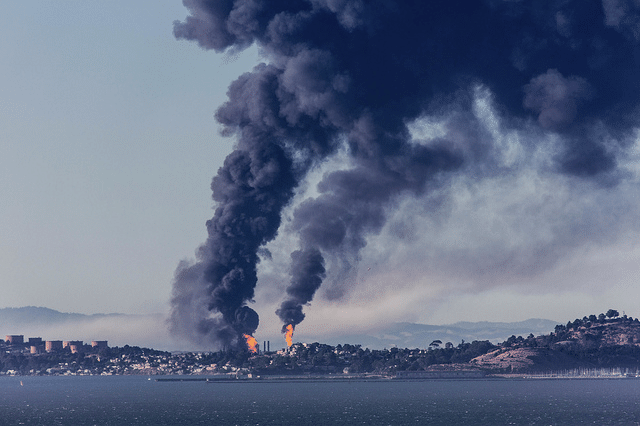 More than two hours passed at Chevron's Richmond, CA, refinery between the discovery of a leak and the ignition of a blaze that threatened the health of thousands of nearby residents and sent hundreds to hospital emergency rooms Monday night. At any point during those hours, shutting down the big crude-oil processing unit in which a pipe was leaking could have prevented or greatly limited the disaster.
More than two hours passed at Chevron's Richmond, CA, refinery between the discovery of a leak and the ignition of a blaze that threatened the health of thousands of nearby residents and sent hundreds to hospital emergency rooms Monday night. At any point during those hours, shutting down the big crude-oil processing unit in which a pipe was leaking could have prevented or greatly limited the disaster.
The San Francisco Chronicle reported details of that excruciating delay Wednesday morning, along with very different accounts of why it happened. The plant's emergency response managers vaugely said they saw the leak as too minor–just "20 drops a minute" at first, to trigger an emergency or notify anyone. Until, of course, it suddenly got bigger and exploded into a blaze. But workers on the ground saw it differently and told their story to their union's safety experts:
"From the time they did see the leak, they debated what to do," said Kim Nibarger, who has investigated refinery accidents nationwide. "It was not so much whether to fix the leak, it was about what could they do to keep the line running and get it fixed."
Nibarger based his opinion on Monday's incident after discussions with union representatives at the refinery. The choice, he said, should have been clear.
"When you have hydrocarbons outside the pipe, you are no longer running at a normal condition. It's time to shut the thing off and fix it, not to try to figure out a way around it."
The last big fire at the Chevron Richmond refinery, in 2007, started the same way: a leak in the same refining unit, No. 4. Two employees were injured and the refinery was shut for months.
What one local resident said in 2007 sounds like it was today:
"Once those [emergency] sirens sound, you are supposed to shelter in place," [the resident] said. "That means nobody goes to work, nobody comes to work in the west end of Richmond and no schools open. The cost of that is incredible."
The costs of shutting down a refining unit to be on the safe side are nothing compared to the costs of shutting down a community, of treating respiratory crises at the emergency room, of higher child asthma rates.
Motorists will also pay. San Francisco and Los Angeles wholesale gasoline prices jumped 30 cents a gallon overnight following Monday's fire. If recent history is any guide, other West Coast refiners will just grab the extra profit rather than raising production to keep supplies up and prices down. That's exactly what happened after a major refinery accident in Washington State last year, according to a study commissioned by Sen. Maria Cantwell.
So all Californians will pay something for Chevron's attempt to keep Unit 4 running even though its own emergency response team knew about the leak.
Safety procedures are also at issue in Chevron's offhore drilling near Brazil, where 155,000 gallons of oil leaked from undersea cracks. Brazil last month accused Chevron of failing to follow its own procedural manual and dismissing troubling test results when it started production from the well. Chevron is also continuing to pay its lawyers millions of dollars to avoid paying damages to Ecuadoran peasants whose land was ruined by Texaco, which is now part of Chevron.
Chevron is not alone in this mindset.
BP ignored safety and quality questions about sealing cement used to cap a deep offshore well in the Gulf of Mexico two years ago, when it could have ordered the cement contractor, Halliburton, to start over (meaning at least a few days of delay). We all know how well that went. BP also skimped on maintenance and ignored corrosion of its Alaska pipeline near Prudhoe Bay in a 2006 spill of 200,000 gallons that shut down the pipeline. Exxon let a known drunk pilot its giant oil tanker, the Exxon Valdez.
It's a long list. But the common thread is that safety is not a profit center for the oil industry and every penny spent on safety dings the bottom line. Until, of course, cleaning up the mess costs millions or billions.

